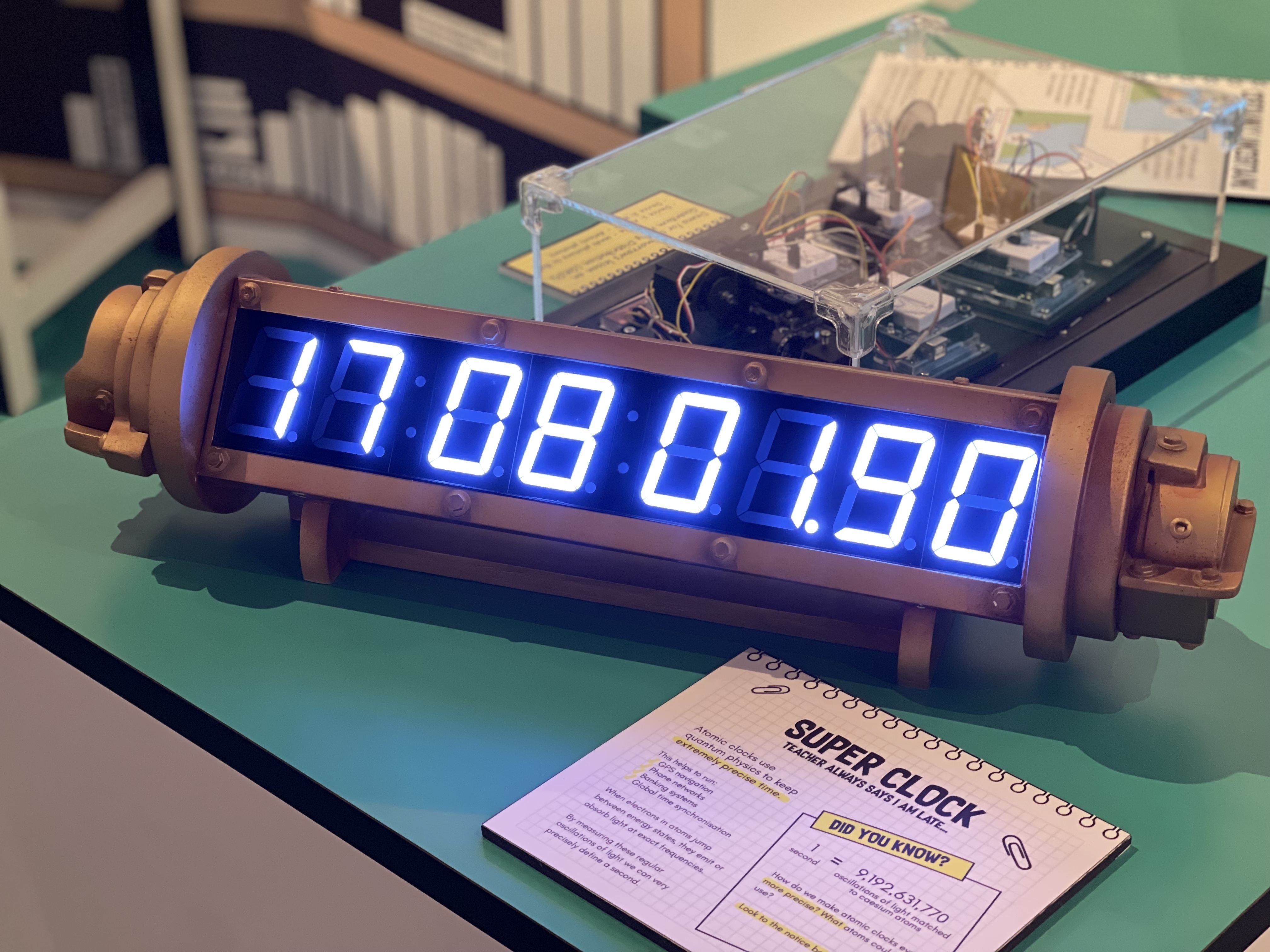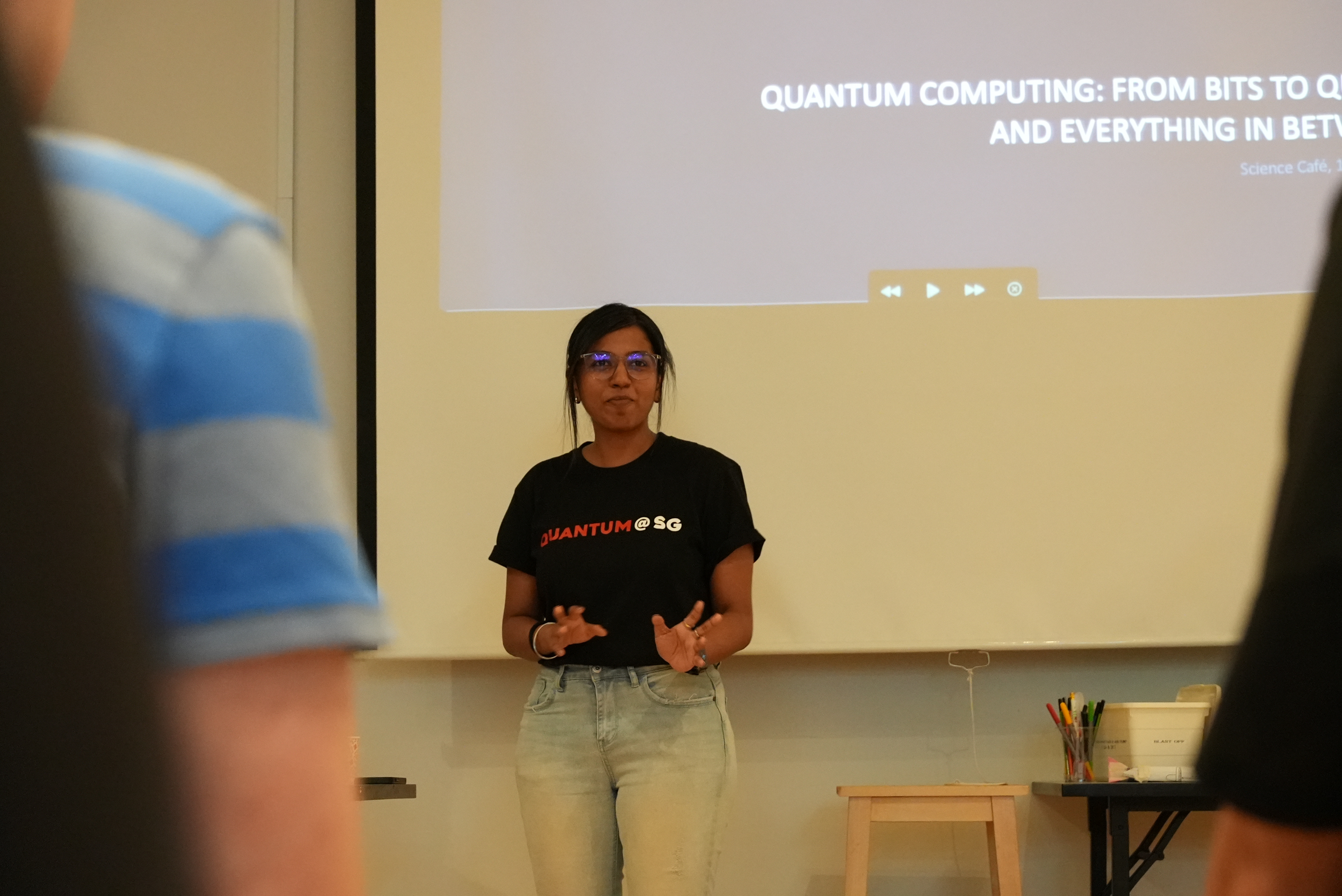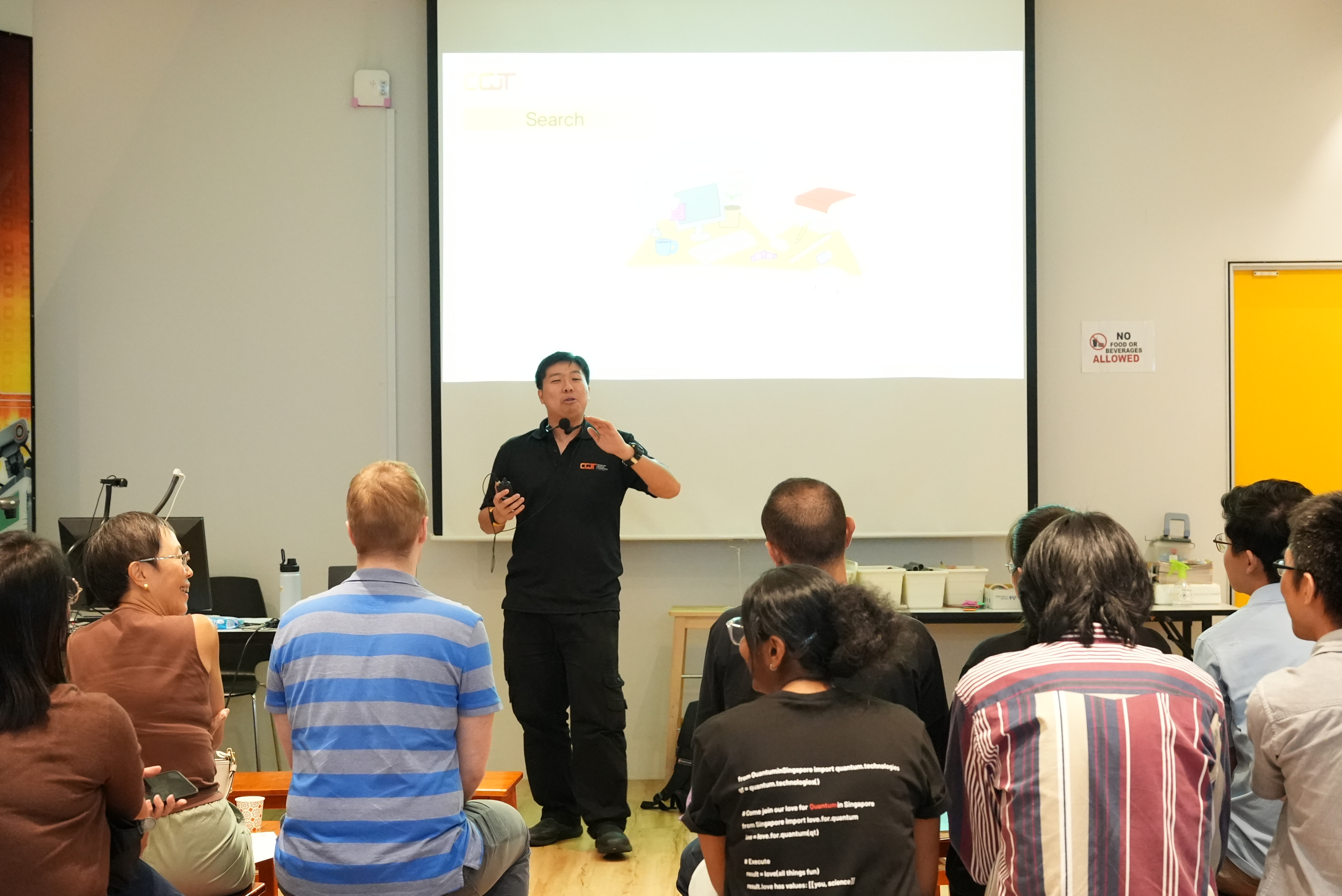Science Cafe: Quantum Computing (Oct 2025)
At Science Centre Singapore's October 2025 Science Café event, attendees enjoyed dinner and drinks while learning about the mind-bending quantum mechanics behind the computers of the future.

Collage of Dr Pooja Jayachandran and Dr Alexander Hue with the background of the Quanta School exhibition in Science Centre Singapore. Speaker photo credits: Lydia König. Graphic created in Canva by Jamie Uy.
Today's computers encode data in binary digits—bits that are either 0s or 1s—but the computers of the future could potentially use quantum bits, or qubits, that can exist in a state of 0, 1, or both simultaneously. This seemingly impossible property could result in unmatched processing power.
To promote public awareness of how quantum technologies could enable these breakthroughs, Science Centre Singapore held The Quantum Café—Sip, Chat, and Compute on Friday 10 October 2025, in collaboration with the Centre for Quantum Technologies.
Hosted at Quanta School, Science Centre's latest exhibition on quantum science, attendees enjoyed a buffet dinner and wine whilst mingling with other science enthusiasts and listening to talks by two quantum experts: Dr Pooja Jayachandran (Staff Scientist, Horizon Quantum) and Dr Alexander Hue (Outreach Manager in Education, Centre for Quantum Technologies).
This October 2025 edition of Science Centre Singapore's Science Café series—a monthly dinner-and-seminar event for adults aged eighteen and above—also marked the International Year of Quantum Science and Technology.

Attendees enjoying a buffet dinner at Science Café: Quantum Computing held at Science Centre Singapore. Photo credits: Lydia König
Exploring the Quantum World
As part of the evening, attendees explored the Quanta School exhibition
after hours. Designed as a topsy-turvy classroom where things behave strangely,
participants interacted with various exhibits demystifying quantum mechanics,
from an atomic clock model to laser beam manipulations replicating Thomas
Young's 1801 double-slit experiment—one
of the fundamental demonstrations proving that light and matter can exhibit
both wave-like and particle-like behaviours.

A model of an atomic clock at the Quanta School exhibition in Science Centre Singapore. Photo credits: Jamie Uy
Bubble Computers and Natural Solutions
To kick off the night, Dr Alexander Hue presented participants with an intriguing brainteaser. He challenged them to imagine being architects attempting to connect cities with the least amount of road. Whilst participants could work through the complex mathematics to find the solution, Dr Hue offered an elegant alternative: tubs of soapy water for dipping physical models of city maps.
Dr Hue explained that since bubbles naturally minimise their surface area, the soap film forming between pegs representing cities would reveal the optimal way to connect them with minimal road length. This hands-on "bubble computer" activity illustrated quantum simulation—the approach of building quantum systems that use physics to solve real-world problems without requiring complicated computations.

Attendees at Science Cafe: Quantum Computing attempting the bubble computer icebreaker. Photo credits: Lydia König
From Bits to Qubits
Building on this foundation, Dr Pooja Jayachandran's talk, "Quantum Computing: From Bits to Qubits, and Everything in Between!" explored the advantages of quantum computers, fundamental quantum mechanics principles, and historical parallels between classical computer development and today's quantum computing revolution.
To illustrate quantum computing's transformative potential, Dr Jayachandran presented a compelling thought experiment: searching through an unsorted telephone directory containing one million names. With classical computers—or searching by hand—the best approach requires checking entries sequentially, one by one. On average, you would need to examine roughly 500,000 entries before finding your target name, representing what computer scientists call a linear search problem.
"However, with a quantum computer, you can do that in about a thousand queries," Dr Jayachandran explained. This dramatic reduction—from 500,000 queries to just 1,000—demonstrates quantum computing's ability to achieve "exponential speed-ups" for certain types of problems.
Whilst fully functional quantum computers capable of such feats remain under development, Dr Jayachandran emphasised that this example represents the extraordinary computational power we could theoretically harness through quantum systems.

Dr Pooja Jayachandran presenting at Science Café: Quantum Computing on 10 October 2025. Photo credits: Lydia König
The "Spooky" Physics Behind Quantum Computing
But how do quantum computers achieve such remarkable performance? Dr Jayachandran detailed how these advantages stem from two fundamental quantum principles: superposition and entanglement.
To explain superposition, Dr Jayachandran used the analogy of a spinning coin. She explained, "Let's say you have a coin, just a normal coin, but instead of heads and tails, you have a zero and one on its faces. And let's say you were tossing this coin right now—it's spinning, it's in the air. However, if you had a quantum coin that's being tossed, it is in principle both zero and one—strange, right—at the same time." Whilst Dr Jayachandran acknowledged that this imaginary quantum coin was an imperfect analogy, she conveyed the mind-bending nature of this concept, admitting "we can't really imagine something actually being in both those states at once."
The second principle, entanglement, is what Albert Einstein famously described as "spooky action at a distance." Dr Jayachandran explained that "quantum entanglement is a physical phenomenon where two or more particles become linked in such a way that the state of one instantly affects the state of another, no matter how far apart they are."
To illustrate this concept, Dr Jayachandran walked participants through another thought experiment involving two people, Alice and Bob, who each receive boxes containing either a green or blue ball. Even if the boxes were at opposite ends of the universe, entangled particles would always exist in correlated states. If Alice opens her box to reveal a green ball, Bob will invariably find a blue ball in his box, and vice versa. For quantum computing, this means that qubits can be linked as one system, so information about one qubit automatically provides information about its entangled partner.
Progress and Parallels
Dr Jayachandran concluded her presentation by acknowledging that whilst "today's quantum computers aren't yet useful for solving hard problems," researchers are "making progress every single day." She noted that "history may be rhyming," pointing to several parallels between classical and quantum computing development.
For instance, classical computing initially gained attention for breaking encryption during World War II, such as cracking the Enigma machine. Similarly, quantum computing's early theoretical breakthrough was Shor's algorithm, which demonstrated the potential to break current encryption methods. Additionally, Dr Jayachandran mentioned that quantum computing's qubit count has been doubling every eight to nine months, surpassing Moore's Law, which governed the doubling of transistors in classical computing every two years.
Practical Applications and Future Possibilities
Dr Jayachandran's presentation was followed by Dr Hue's talk, "So You Have A Quantum Computer! …Now What?" in which he explored the practical applications of quantum computing. Dr Hue began by defining quantum supremacy as the point where "for a specific task, quantum computers can solve it faster than any classical computer"—exemplified by Dr Jayachandran's telephone directory search demonstration.
Quantum computing could particularly revolutionise materials science, biomedical research, and drug discovery. Dr Hue referenced Richard Feynman's insight that "nature isn't classical, and if you want to make a simulation of nature, you better make it quantum mechanical." Consequently, Dr Hue explained, "quantum computers can help design better materials and cures, understand biomolecules, or even increase the rate of chemical processes." Beyond these scientific applications, quantum computers could optimise financial portfolios, minimise delivery route times, and factor large numbers for cryptography.

Dr Alexander Hue presenting at Science Café: Quantum Computing on 10 October 2025. Photo credits: Lydia König
Looking Towards Tomorrow
Dr Hue acknowledged that current quantum computers are large and impractical for everyday use, but suggested that technological advances may lead to miniaturisation. He referenced a statement attributed to former IBM chairman Thomas J. Watson, who allegedly said in 1943 that there was "a world market for maybe five computers," to illustrate how difficult it can be to anticipate rapid technological development.
"Quantum computers may someday be in our pocket—we don't know yet, but we hope," Dr Hue said.
He explained that "even without a quantum computer, developing quantum algorithms, which inherently use different logic, is already helping us think of different approaches for classical computers."
To conclude the evening, attendees tackled quantum programming puzzles developed by Dr Hue, gaining hands-on familiarity with the basic principles behind quantum algorithms.
Want to try this yourself? If you’d like to design, visualise, and run your own quantum circuits at home, check out this online Quantum Circuit Simulator resource recommended by Dr Hue.
Join Us at Science Café!
Science Centre Singapore's sip-and-discover series, Science Café, explores interdisciplinary topics from quantum entanglement to healthy ageing and marine biodiversity. Join us on Tuesday 18 November 2025 from 7:00–8:30pm at Hall B, OceanX Portal, Science Centre Singapore for a special dinner event in collaboration with OceanX, an ocean exploration organisation that aims to unlock the ocean's sustainable potential through science and education.
Hear from the crew aboard the research vessel OceanXplorer via livestream and learn about groundbreaking technologies and the people who make ocean exploration possible on the high seas and in the deep ocean. Tickets are S$20.00 and open to all participants aged eighteen and above. Click here for full event details and registration.
Written by Jamie Uy
Published 10 November 2025

